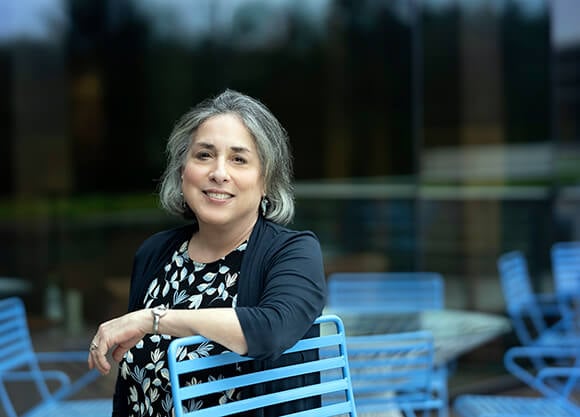
Recognizing that all humans are valuable, finding ways to understand their circumstances are tenets of the social work program
March 19, 2024

March 19, 2024

At Quinnipiac, future social workers are being prepared to meet the unique needs of those they serve through collaborative experiences including clinical and field education opportunities. The work is fitting as the International Federation of Social Workers’ World Social Work Day theme this year is “Buen Vivir: Shared Future for Transformative Change.” The concept emphasizes the need for social workers to adopt innovative, community-led approaches grounded in indigenous wisdom and harmonious coexistence with nature.
Quinnipiac’s Master of Social Work (MSW) and MSW Advanced Standing programs prepare knowledgeable and ethical social workers for specialized practice in health and mental health settings through a curriculum that focuses on clinical and organizational practice, experiential learning and interprofessional teamwork.
Laura Mutrie, founder of Quinnipiac’s MSW program, is the director of field education and an assistant clinical professor in the MSW program at the School of Health Sciences on the North Haven Campus. She said it’s important to consider all of the methodologies which work to promote social justice and human well-being, especially to those in vulnerable communities.
“A lot of people come into social work thinking they may want to have a private practice or work with individuals. But I think it’s so important to work at all the levels, from micro to mezzo to macro work,” said Mutrie. “A social worker needs to be somebody who is seeing communities and organizations, and families and individuals, as a client base. It’s about helping to figure out how to meet their needs with them, then collaborating with them in whatever kind of work we do, and wherever we have the power to help.”
Social Work Department Chair and Masters in Social Work Program Director Carol Awasu said Mutrie’s contributions to Quinnipiac’s program and students are remarkable.
“She is the founding field education director at Quinnipiac. Quinnipiac being the first MSW program at a private school means that Laura Mutrie is really the first director among private universities and colleges in Connecticut,” said Awasu.
Mutrie said Quinnipiac’s social work programs want to instill students who will be the future of the profession with an important set of values. They include valuing the worth and dignity of the individual human being, while also working to promote social justice.
“Especially in our world of technology and everything being automated, we need to preserve the dignity of humanity, human rights and of social justice,” said Mutrie. “If my students learn from me that part of our profession’s belief system is that human beings are valuable, just by being human, that’s the most important thing to me. And if we truly value and respect them and our relationships, wherever we find them, then that is the essence of social work.”
Compassion, empathy and curiosity to develop relevant and important contextual understanding of the people they serve are additional qualities of impactful social work professionals, Mutrie said.
“Sometimes as a society, we don’t acknowledge that what happens to people changes how they behave; we only see the behavior and not the story behind it. What happened? What obstacles were in their way? How did the system, or how did the institution, influence that behavior? How was it unfair, and how can we make it better? If you want to understand all that, you need curiosity. Social workers need to be curious about everything,” said Mutrie.
Within Quinnipiac’s social work community, Mutrie is a cherished faculty member and has served as a memorable instructor and mentor to many students.
“Laura played a vital role in my graduate career, as well as helping me overcome my anxieties and pass my LCSW exam. She is truly the most amazing woman,” said Tara Zaretsky, MSW ’16.
For every social work professional who is passionate about their work, helping to improve lives with outcomes that are more just, even within a very small sphere of influence, is the reward, said Mutrie.
“If you can do that in your own way, in every interaction that you have, you are adding to the hope that things can change,” said Mutrie.
Quinnipiac Today is your source for what's happening throughout #BobcatNation. Sign up for our weekly email newsletter to be among the first to know about news, events and members of our Bobcat family who are making a positive difference in our world.
Sign Up Now